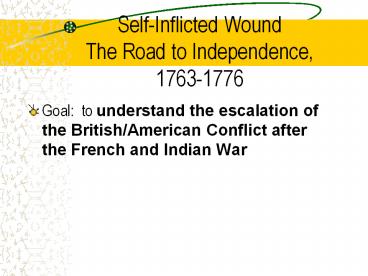SelfInflicted Wound The Road to Independence, 17631776 - PowerPoint PPT Presentation
1 / 14
Title:
SelfInflicted Wound The Road to Independence, 17631776
Description:
Appreciated the British legal and political system; enjoyed freedom from British ... Quartering Act (stationing of 10,000 lobsterbacks) ... – PowerPoint PPT presentation
Number of Views:78
Avg rating:3.0/5.0
Title: SelfInflicted Wound The Road to Independence, 17631776
1
Self-Inflicted WoundThe Road to Independence,
1763-1776
- Goal to understand the escalation of the
British/American Conflict after the French and
Indian War
2
Most Colonists LIKED Being British until 1760s
- Appreciated the British legal and political
system enjoyed freedom from British control
(Salutary Neglect) - England provided protection for lucrative
cross-Atlantic trade - Most colonists WERE British and spoke English
3
The Colonies Disliked Each Other More than the
British
- James Otis "were these colonies left to
themselves tomorrow, America would be a mere
shambles of blood and confusion" (1765)
4
French and Indian War Changes the Whole
Relationship
- Very expensive to beat the French and Indians
between 1754-1763 - Very expensive fighting in Europe
- American colonists dont pay their fair share
(what good is a colony if it doesnt benefit
the mother country?)
5
The trouble all starts with one little report . .
.
- Chancellor of the Exchequer ("royal financial
advisor") suggests tightening up the
import/export tax system (customs duties) - His suggestions are implemented by King George
III to the dismay of all, it turns out
6
Problem Colonists Print Their Own Money
- Solution Currency Act -- all trade and British
salaries to be paid in pounds sterling
7
Problem Colonists want to move West
- Solution Proclamation Act, 1763
- Quartering Act (stationing of 10,000
lobsterbacks)
8
Problem Britain's taxes are up due to the F I
war
- Solution improve the system of tax collection
(see Letter from the Exchequer document) - Impose a series of acts
- Sugar Act
- Stamp Act
- Create military courts
9
Problem "Can we tax the American colonists
without representation"?
- Solution invent the term "virtual
representation" (few Englishmen can vote, either,
but they are "virtually represented" by their
elected peers)
10
Colonial Response, 1765-gt
- Break things (Sons of Liberty/mobs)
- Boycott things
- Badger the King
- Claim "rights of Englishmen
- Claim "no taxation without representation"
- Broach the topic of independence
- Patrick Henry of Virginia
- Sam Adams of Boston
11
British Response
- Back down time and time again British choose
to repeal acts in face of concerted opposition - But Declaratory Act (so there!)
- But Try other tax schemes
- But British soldiers and colonists
- undermine conciliation efforts
- Boston Massacre
- Gaspee Incident
- Boston Tea Party
12
England Finally Puts Its Foot Down Too Late . .
.
- Coercive Acts (Intolerable Acts)
- Colonial response 1st Continental Congress
- asks politely for return to old rules
- Imposes a debilitating boycott on British
products - Quebec Act (Not the Catholics! Not in Our
Backyard! Mon Dieu!)
13
Hostilities Begin The Shot Heard Round the
World
- British decide to pacify the colonists
- Colonists form militias (minute men)
- Colonists create a network of spies (Paul Revere
is most famous) - British attempt to seize a weapons cache in
Concord, Massachusetts - Colonists resist
- War Begins in 1775
14
Colonial Response to Bloodshed
- Second Continental Congress meets
- Prepares for war (George Washington)
- Sues for peace (Olive Branch Petition)
- King George III is adamant no more compromises
- Fighting Continues (Bunker Hill)
- Thomas Paine writes Common Sense
- Thomas Jefferson writes Declaration of
Independence July of 1776































